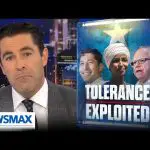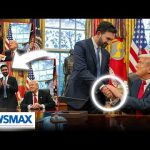Peter Doocy’s blunt warning on Special Report was not theater — it was a wake-up call. On November 24, Doocy told viewers that ongoing peace efforts to end the Russia-Ukraine war face real peril if negotiators rush or cave on core security principles.
The headlines this month have centered on a 28-point U.S. draft peace proposal that Washington quietly circulated as it pushed for a diplomatic end to the fighting. That draft, circulated in mid-November, was billed as a framework to bring Russia and Ukraine to the table and to lock in security guarantees — but the details matter and Americans should demand transparency.
Reporters and diplomats say the document drew immediate criticism for containing lines that read like concessions rather than a firm defense of Ukrainian sovereignty. The Washington Post reported that the plan was revised after pushback because portions looked dangerously favorable to Moscow, a development that should alarm anyone who believes in deterring aggression rather than rewarding it.
Ukrainian leaders have pushed back, arguing that peace must preserve dignity and independence rather than trade them away for temporary calm. President Zelensky’s public reaction made it clear that Kyiv won’t sign a paper that leaves it weaker or isolated, and Americans should stand with that sober, courageous stance rather than with quick fixes that hand advantage to our adversary.
Meanwhile, the White House has been actively pressing both Kyiv and Moscow to meet and negotiate, with the administration publicly touting its role as the broker. President Trump’s team has ramped up diplomatic pressure to produce talks, but pressure without principle risks producing a bad deal that could unravel the nascent momentum and jeopardize long-term security.
This is exactly why Doocy’s warning matters: conservative skepticism of hurry-up diplomacy is not obstructionism, it’s common-sense defense of American interests. If our negotiators cut corners to force a headline, they may strip away the leverage that has kept NATO unified and restrained Russia’s ambitions; that would be a strategic failure dressed up as success.
Patriotic Americans should demand that any peace agreement be anchored in clear security guarantees, verifiable demilitarization where appropriate, and restitution for territorial violations — not secretive drafts with loopholes. Journalists like Doocy calling out the risks are doing the country a service, and conservatives must press for accountability from leaders who claim to be delivering peace.
We can want peace and still insist it be a just peace, one that protects freedom and deters future aggression. Now is the time for steady leadership, ironclad terms, and public scrutiny — not haste or capitulation — because the cost of a bad deal will be paid by Ukraine, our allies, and ultimately by the security of the United States.




